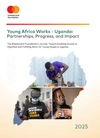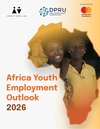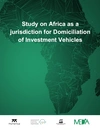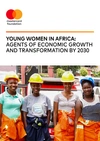The Mastercard Foundation’s Journey Toward Enabling Access to Dignified and Fulfilling Work for Young People in Uganda
Executive Summary
Uganda has one of the youngest populations in the world, with 78 percent of its people under the age of 30 (UBOS, 2021). It is also home to over 1.7 million refugees and asylum seekers, most of whom are young people (UNHCR, 2024). For Uganda’s young people, access to education, skills, and economic opportunities is critical to securing dignified and fulfilling work.
Alongside our partners, the Mastercard Foundation is helping create opportunities for young people in high-potential sectors such as agriculture, micro, small, and medium enterprises (MSMEs), and the digital economy through our Young Africa Works strategy. The strategy aligns with Uganda’s Vision 2040 and the National Development Plan, which prioritize youth participation in economic transformation through education, vocational training, and entrepreneurship.
Over the past five years, Young Africa Works in Uganda has made significant progress, engaging over 3.8 million young people to acquire skills, and access finance to start or grow their enterprises. Of these, 1.3 million have successfully transitioned into work, securing employment, starting businesses, or expanding their economic opportunities. These initiatives have prioritized inclusion by ensuring young women, refugees, and persons with disabilities actively participate in and benefit from the programs. They have empowered MSMEs, strengthened financial literacy, and improved access to affordable loans, contributing to economic resilience during and after the COVID-19 pandemic.
Entrepreneurial support has been a key pillar of the Foundation’s work, supporting young people like Hellen Birungi to scale their businesses and improve their livelihoods. Through the Hi-Innovator program, Hellen received not only financial support but also business development training, mentorship, and market linkages to grow Heb’s Organic, an eco-friendly beauty business. With these resources, she was able to purchase equipment, expand her team, and increase her monthly revenues from $190 to $1,300. Beyond entrepreneurship, education plays a crucial role in preparing young people for leadership and economic success. Through the Mastercard Foundation Scholars Program and higher education initiatives, about 20,00 young people have accessed education opportunities. Graduates from this program are now creating jobs, fostering innovation, and driving social and economic change in their communities. Agriculture remains a cornerstone of the Foundation’s work, empowering young people to adopt modern, climate-smart practices, improve productivity, and access markets. Similarly, digital skills training has opened new avenues for young people to thrive in the digital economy, preparing them for jobs of the future.
While progress has been made, more can be done to reach rural and underserved areas, ensure more young women benefit from the programs, and improve financial access for young people and small businesses. Addressing these challenges requires strong partnerships, flexibility, and a continued commitment to inclusion.




